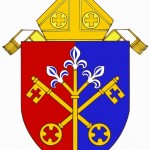 Well, this was a first for me: Today Facebook deleted a post I’d written, telling me that I’d offended community standards, and warning me that I should delete any other offensive content on my wall, or risk being permanently removed from Facebook.
Well, this was a first for me: Today Facebook deleted a post I’d written, telling me that I’d offended community standards, and warning me that I should delete any other offensive content on my wall, or risk being permanently removed from Facebook.
It’s been a few weeks since the post in question, so I am no longer able to go back and retrieve the conversation—but this is exactly what I said in my “hateful, offensive” post:
Just poppin’ in here a little late– but I want to understand what I’m reading. Diane, did you just say that you are Catholic, but that you believe the child of a rapist should be murdered? I’m having a bit of trouble squaring that with what I know about our laws. If I rob a bank, steal a car, even commit murder, can you kill my child? That’s abhorrent to even consider.
The way I see it, I was respectful, low-key, willing to engage on the issues. I did not call her names. I did not come out swinging. I gave her an opportunity to clarify, in case I had misunderstood. I feel a bit like the honest, hardworking kid who’s been accused of cheating on a test; if there is anything disrespectful or untoward about my post, could you please explain it to me so that I won’t say anything so horrendous again?
I remember the conversation stream into which I brazenly interjected my insolent pro-life message. There were a bunch of folks shooting their mouths off on medical and political issues, hurling specious accusations against people of faith. They were an “Occupy Humanity” gang, flying their flag of abortion rights and taking no prisoners. It just didn’t seem right that their slanderous accusations should go unchallenged.
By the way, a quick check of just a few friends’ walls turned up the following posts which Facebook has NOT deleted:
- f**kin love this 😀
- Being an a**hole is all part of my manly existence.
- Even “LMFAO.”
The Facebook administrators warn me that people who use Facebook can and do report content that they find questionable or offensive. Their policy protects Facebook users from abuse in nine different areas including:
- Threats
- Promoting self-harm
- Bullying and harrassment
- Hate speech
- Graphic violence
- Sex & nudity
- Theft, vandalism or fraud
- Identity and privacy
- Phishing or spam
Hmmph. Looking over this list, I guess I committed hate speech when I (sans obscenities) dared to question the opinion of the woman named Diane.
One of the really great things about Facebook and other social media is that it permits an exchange of ideas across the political spectrum. If I, in placing value on all human life even in cases of rape or incest, am guilty of hate speech, then perhaps we should hang this whole “social networking” thing up and go home.
* * * *
I am reminded of another story which you may have read over the weekend, involving Bishop Philip Boyce, bishop of the Raphoe diocese in northwestern Ireland. Bishop Boyce has been accused of a “hate crime” by outspoken humanist John Colgan, who complains that the bishop’s remarks in a homily delivered at Our Lady of Knock shrine “are an incitement to hatred of dissidents, outsiders, secularists, within the meaning of the (Incitement to Hatred) Act, who are perfectly good citizens within the meaning of the civil law.”

According to Colgan, the bishop’s sermon implied that non-believers will “end their lives in emptiness”—and that this constitutes abuse of atheists, humanists and skeptics. The bishop, says Colgan, was “picking on” unbelievers.
 The case against Bishop Boyce, which appears frivolous on its face, is nonetheless being taken seriously by Irish officials. The office of the Garda (Police) Commissioner has referred the complaint to the Director of Public Prosecutions. Should the case proceed through the courts, an offense against the Prohibition of Incitement to Hatred Act of 1989 carries a penalty of up to two years in prison.
The case against Bishop Boyce, which appears frivolous on its face, is nonetheless being taken seriously by Irish officials. The office of the Garda (Police) Commissioner has referred the complaint to the Director of Public Prosecutions. Should the case proceed through the courts, an offense against the Prohibition of Incitement to Hatred Act of 1989 carries a penalty of up to two years in prison.
Bishop Boyce’s sermon, titled “To Trust in God,” can be viewed in its entirety at the Irish Bishops’ website.











